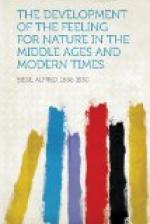What sinned I more herein
Than others, who were also born?
Born the bird was, yet with gay
Gala vesture, beauty’s dower,
Scarcely ’tis a winged flower
Or a richly plumaged spray,
Ere the aerial halls of day
It divideth rapidly,
And no more will debtor be
To the nest it hates to quit;
But, with more of soul than it,
I am grudged its liberty.
And the beast was born, whose skin
Scarce those beauteous spots and bars,
Like to constellated stars,
Doth from its greater painter win
Ere the instinct doth begin:
Of its fierceness and its pride,
And its lair on every side,
It has measured far and nigh;
While, with better instinct, I
Am its liberty denied.
Born the mute fish was also,
Child of ooze and ocean weed;
Scarce a finny bark of speed
To the surface brought, and lo!
In vast circuits to and fro
Measures it on every side
Its illimitable home;
While, with greater will to roam,
I that freedom am denied.
Born the streamlet was, a snake
Which unwinds the flowers among,
Silver serpent, that not long
May to them sweet music make,
Ere it quits the flowery brake,
Onward hastening to the sea
With majestic course and free,
Which the open plains supply;
While, with more life gifted, I
Am denied its liberty.
In Act II. Clotardo tells how he has talked to the young prince, brought up in solitude and confinement:
There I spoke with him awhile
Of the human arts and letters,
Which the still and silent aspect
Of the mountains and the heavens
Him have taught—that school
divine
Where he has been long a learner,
And the voices of the birds
And the beasts has apprehended.
Descriptions of time and place are very rich in colour.
One morning on the ocean,
When the half-awakened sun,
Trampling down the lingering shadows
Of the western vapours dun,
Spread its ruby-tinted tresses
Over jessamine and rose,
Dried with cloths of gold Aurora’s
Tears of mingled fire and snows
Which to pearl his glance converted.
Since these gardens cannot steal
Away your oft returning woes,
Though to beauteous spring they build
Snow-white jasmine temples filled
With radiant statues of the rose;
Come into the sea and make
Thy bark the chariot of the sun,
And when the golden splendours run
Athwart the waves, along thy wake
The garden to the sea will say
(By melancholy fears deprest)—
’The sun already gilds the west,
How very short has been this day.’
There is a striking remark about a garden; Menon says:
A beautiful garden surrounded by wild
forest
Is the more beautiful the nearer it approaches
its opposite.




